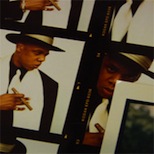Memphis Director Tim Sutton Speaks on Film, Inspiration, & Critics
09.03.2014
LEISURE
“It’s not a movie for everyone,” director Tim Sutton says regarding his latest film Memphis. What on the outside appears to be a linear blues film starring Willis Earl Beal as an artist struggling with writer’s block is a far more abstract and ambiguous piece of art. It’s the type of film that requires patience as it is told less with dialog and more with imagery. To the untrained eye it’s a scattershot piece of poetry that leaves a lot up for interpretation. Beautifully shot, Memphis is unconventional and often resembles a coffee table book of obscure paintings. It fell on both extremes of love and hate at the film festival and Life + Times spoke with Tim Sutton about the film’s meaning, creative direction and why some things are better left up to interpretation.
L+T: What was the inspiration behind Memphis?
Tim Sutton: I’m fascinated by the musician’s mind and lifestyle, especially when that musician has an otherworldly vision. Artists like Jimi Hendrix, Thelonious Monk or John Coltrane have demonstrated that. I’ve always been fascinated by those that have the gift of God but move to the beat of their own drum. I’m a big fan of the singer O.V. Wright (“Motherless Child”). He’s supposedly the greatest singer to ever come out of Memphis. Al Green and Aretha Franklin used to sneak into the studio to listen to his sessions. But he died an addict and buried in an unmarked grave…
L+T: The fall of many great musicians…
TS: Yes. It’s an American tragedy. I thought what if I combine these two different kinds of characters and create someone who has the gift of God and should be at the top but ends on a whole different path. I basically wrote a story about Willis Earl Beal without even knowing him. So when we showed him the script he was everything I had ever thought that should be in this story.
L+T: How much did you know about Beal before meeting him?
TS: I didn’t know anything about him. Willis had something completely different from everybody. He really was someone that had such an incredible voice but when he would take a break his face was drained of every bit of life. He gives everything to that voice. I knew he could do what we wanted him to do for this film.
L+T: Considering the type of personality he is, did you have to craft the story around his real persona?
TS: We scheduled day by day so the story completely evolved. We’d plan at night, do rewrites and make storyboards for the next day. With Willis, he read the script twice and never looked at it again afterwards. I ‘d set up the scene and would tell Willis minutes before the scene what he would be doing. Very rarely would I ask him to do it a certain way because that’s where the magic is. I’m not Willis; I want to watch him just like everyone else.
L+T: What did you learn about Memphis while shooting on location?
TS: I’m an outsider. I’ve been there before and had real wonderful moments connecting with people in the real neighborhoods. I knew I wanted to make a movie there. We made friends with the community from the people on the street corners and the preachers to the woman who ran the barbecue. Being an outsider with an inside track is important to this film. We wanted to learn from them. My kind of filmmaking is liquid. I want to go to a place and become a part of that place and mix the two ideas together rather than say here’s my vision, you’re my location.
L+T: Authenticity seems to be a very important aspect to this film.
TS: There’s not an actor in the movie including Willis. Every location is real. There’s not a “set” in the movie. You don’t go down there and make your own thing. You use what is down there and tweak that into a way that heightens it. I didn’t want to make a purely realistic movie nor a purely ethereal movie; I wanted to mix the two. We went to a real church and said that we just wanted to insert our guy into their atmosphere. We filmed that scene once. When we shot the scene at his recording session we said to him “make a single.” The movie is about letting the authenticity be. You’ve got to capture the moment. Miles Davis used to say what was so awesome about Frank Sinatra wasn’t his voice, but the time between he sang, the rests. As a filmmaker it’s just as much about how you lay off as it is how you lay on. That’s why Memphis has this real loose authentic feeling but you feel that you are in the hands of the story.
L+T: This film felt a lot like improvisational jazz and abstract art, which in turn also may need an explanation for those who don’t immediately grasp the concept.
TS: The movie is about a lot of things even though it often comes off as if it is about nothing. The movie I suppose is about writer’s block, but it’s also about the quest for glory and freedom. Here’s a person that is living in a place with ghosts and spirits but he’s trying to pass through to a new sense of freedom. The music and writing are secondary. People who are psyched for a blues movie, it’s not that. It really is a blues experience. It’s about a journey.
L+T: He seemed like a character that struggled with the concept of even making music for mass consumption.
TS: What he can do is beautiful. When he’s singing in the attic, that’s a part of him. But to make music in a way that people expect him to is not part of him.
L+T: There were some scathing reviews when this film screened at Sundance. Are you concerned that the preliminary reviews will ruin the experience?
TS: It’s not a film for everybody and I knew that. If you think the film is poor quality or not good you’re not watching the film. It’s nuanced and challenging. It makes you wonder if you’re getting it or not. It’s about deep things that are never explained. Memphis is not going to make a huge splash commercially. It works because it is an abstract piece of art. You look at the images and it sits with you for a long time. You may have a different favorite picture and the dialog can create a new life for the film.





